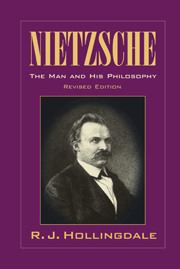Book contents
- Frontmatter
- Contents
- Preface to the Revised Edition
- A List of Nietzsche's Works
- Part I 1844-1869
- Part II 1869-1879
- 4 The Professor
- 5 Wagner, Schopenhauer, Darwin and the Greeks
- 6 Basel and Bayreuth
- 7 Sorrento and an End in Basel
- Part III 1879-1889
- PART IV 1889-1900
- Postscript 1999
- Selective Bibliography
- Index
5 - Wagner, Schopenhauer, Darwin and the Greeks
from Part II - 1869-1879
Published online by Cambridge University Press: 13 September 2019
- Frontmatter
- Contents
- Preface to the Revised Edition
- A List of Nietzsche's Works
- Part I 1844-1869
- Part II 1869-1879
- 4 The Professor
- 5 Wagner, Schopenhauer, Darwin and the Greeks
- 6 Basel and Bayreuth
- 7 Sorrento and an End in Basel
- Part III 1879-1889
- PART IV 1889-1900
- Postscript 1999
- Selective Bibliography
- Index
Summary
For me they were steps, I have climbed up upon them—therefore I had to pass over them. But they thought I wanted to settle down on them. (G I 42)
As soon after coming to Basel as he conveniently could, Nietzsche visited Wagner at Tribschen. Wagner was at work when he paid his first call on the 15th May (1869), but invited Nietzsche to come back for lunch; Nietzsche was unable to do this, so Wagner suggested he return two days later, on Whit Monday. The meeting was so successful that he was again invited, this time to attend Wagner's birthday celebrations on the 22nd. Nietzsche's teaching duties made this impossible, and he was next at Tribschen for the weekend of the 5th to the 7th June. From then onwards he was a regular visitor, staying with the Wagner family twenty-three times between May 1869 and April 1872, when Wagner departed for Bayreuth. He was a guest for Christmas 1869 and again in 1870; on that occasion he formed part of the tiny audience which heard the first performance of the Siegfried Idyll, Wagner's Christmas and birthday present to Cosima. (Her birthday fell on the 24th December.) Before the year 1869 was over he had been accepted—one might almost say adopted—as a member of the household, with a room of his own which he might use any time he chose to; often he had charge of the Wagner children, who treated him like an elder brother.
The importance in Nietzsche's life of his relationship with Wagner can hardly be exaggerated. The experience was an awakening: his eyes were opened to the possibilities of greatness that still existed in human nature. He learned the meaning of genius and strength of will, expressions he had used without any very lively sense of their real significance. In course of time he learned other things from Wagner, and not always those things Wagner would most willingly have taught him: that even the most sincere man is still very much an actor, that pettiness and greatness can co-exist in the same soul, that love and hate are not mutually exclusive but opposite aspects of the same emotion.
- Type
- Chapter
- Information
- NietzscheThe Man and His Philosophy Revised Edition, pp. 56 - 85Publisher: Cambridge University PressPrint publication year: 1999



